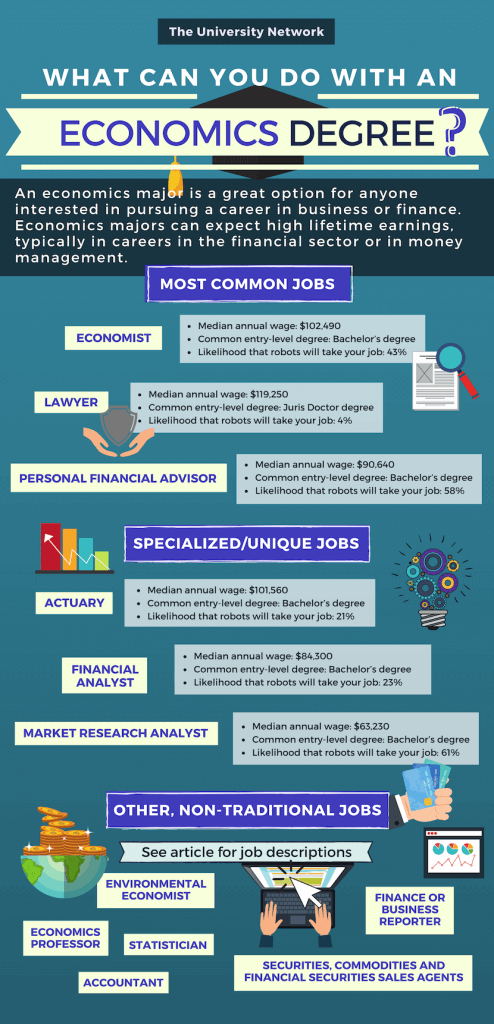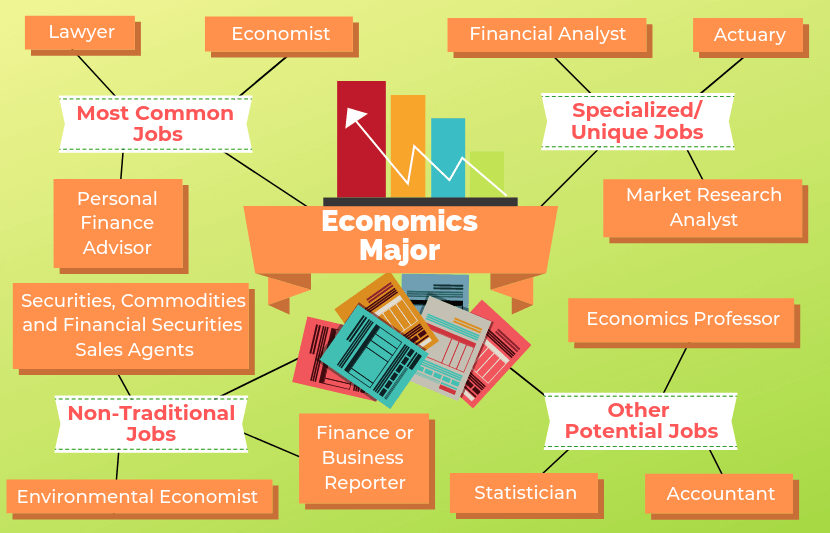Job Ideas for an Economics Career

An economics major is a great option for anyone interested in pursuing a career in business or finance. Economics majors can expect high lifetime earnings with projected job growth, typically in careers in the financial sector or in money management. For those interested in economics who do not envision a career in finance, there are still plenty of other options in government, academia and elsewhere.

Here is a list of 12 possible jobs for economics majors:
Most Common Jobs for Economics Majors
1. Economist
Let’s start out with an obvious one. An economics degree sets you up perfectly for a career as an economist. Economists are employed by a variety of institutions, including governments, universities, think tanks, corporations and private research firms, to evaluate economic issues. They spend their days conducting qualitative and quantitative research for organizations in an attempt to solve economic issues or better understand the function of the economy. Depending on their employer, an economist’s duties and role might vary. For example, an economist working in government might formulate policy proposals, while an economist working for private corporations or private businesses might help the company understand how the economy might affect its business or develop strategies that will help it perform better. Advancement in the field requires a master’s degree or a doctorate, but there are entry-level positions available for candidates with only a bachelor’s degree.
Median annual wage: $102,490
Common entry-level degree: Bachelor’s degree
Likelihood that robots will take your job: 43%
2. Lawyer
It is not uncommon for economics majors to go to study and practice law. Many lawyers work in the intersection between finance and law as banking lawyers, tax lawyers, or real estate lawyers. Earning a bachelor’s degree in economics before law school can set you up perfectly for this kind of career. In order to become a lawyer, you will have to pass the Law School Admissions Test (LSAT), apply to law school, earn a Juris Doctor degree and pass the Bar examination — all before you can begin to practice law. Generally, it takes 3 years to graduate from law school, so the entire process takes 7-8 years.
Median annual wage: $119,250
Common entry-level degree: Juris Doctor degree
Likelihood that robots will take your job: 4%
3. Personal Financial Advisor
Personal financial advisors work with clients to discuss and meet their financial goals, providing advice on anything from investments to mortgages to retirement funds. A bachelor’s degree in economics is typically enough to gain entry into the field. Depending on your role in the company you work for, and particularly if you are involved in trading stocks and making investments, you may need licensing and certification from the Securities and Exchange Commission.
Median annual wage: $90,640
Common entry-level degree: Bachelor’s degree
Likelihood that robots will take your job: 58%

Specialized/Unique Jobs for Economics Majors
4. Actuary
Actuaries use mathematics, statistics, and financial information and economic theory to assess the financial costs of risk and uncertainty. Actuaries work for a variety of businesses, and they are essential positions at financial consultancies, insurance agencies and banks. A bachelor’s degree is typically all that’s needed to enter the industry. Aspiring actuaries must also pass a series of exams to become certified in the profession. Professional actuaries should be certified through the Casualty Actuarial Society (CAS) or the Society of Actuaries (SOA). Both groups have a unique set of tests you have to pass. If you recently graduated from college and want to become an actuary, now is the time to start preparing for those tests. They can take hundreds of hours to prepare for.
Median annual wage: $101,560
Common entry-level degree: Bachelor’s degree
Likelihood that robots will take your job: 21%
5. Financial Analyst
Financial analysts are responsible for examining financial data in order to provide information and guidance to businesses or individuals on business and investment decisions. They are employed within the financial industry by investment banks and firms and outside of the financial industry by smaller banks, insurance companies, and real estate brokerages. Financial analysts will examine trends in the market and individual companies’ statements to compile investment recommendations. Financial analysts typically must have a bachelor’s degree in a related field.
Median annual wage: $84,300
Common entry-level degree: Bachelor’s degree
Likelihood that robots will take your job: 23%
6. Market Research Analyst
Market research analysts are employed by a company or a marketing firm to study market conditions for a particular product or service. Market research spend their days researching, monitoring and forecasting marketplace trends by gathering data on consumer behavior and analyzing market data. They also help develop marketing strategies and campaigns for their clients or company. A degree in economics, marketing, business or a related field is essential for entry into the field. An advanced degree for graduate school is typically not necessary for entry-level positions, but provides opportunities for advancement into a leadership role.
Median annual wage: $63,230
Common entry-level degree: Bachelor’s degree
Likelihood that robots will take your job: 61%
Non-Traditional Jobs for Economics Majors
7. Environmental Economist
Environmental economists work at the intersection of economics and environmental science, studying how environmental resources are extracted, developed, managed and traded. They may work for governmental organizations like the EPA to help craft policy on issues relating to energy use and the environmental impact of various industries. There are also job opportunities with projected job growth to work at environmental consulting firms determining the financial and environmental costs associated with economic development projects. This kind of position typically requires an advanced degree with a strong background both in math and environmental science. Some schools, such as University of California, Berkeley and Colorado State University, offer undergraduate degrees in environmental economics, while Duke University and the University of Rhode Island have graduate programs.
Median annual wage: $102,490
Common entry-level degree: Master’s degree
Likelihood that robots will take your job: 43%
8. Finance or Business Reporter
This is perfect for those who are fascinated by economics and business but don’t want to get caught up in the day-to-day of a job in the financial sector. Business writers cover important developments in the international relations of the business world and comment on the dynamics of the economy at large. The best writers have a natural curiosity for economics and the world of finance and financial institutions. There’s no education requirement to become a writer, but a bachelor’s degree in economics with coursework in English and journalism can provide you with a solid footing when entering the job market.
Median annual wage: $39,370
Common entry-level degree: Bachelor’s degree
Likelihood that robots will take your job: 11%
9. Securities, Commodities and Financial Securities Sales Agents
Securities, commodities and financial sales agents act as the middleman in the financial market. They connect buyers and sellers, sell securities (such as stocks and bonds) and commodities, advise companies seeking investors, and facilitate trades. This is typically a fast-paced, high stress, high risk and high reward job. Pay varies wildly based on experience, expertise and ability. Typically a bachelor’s degree with coursework in economics, business and finance is enough to get an entry-level position, though a master’s degree certainly provides an advantage.
Median annual wage: $63,780
Common entry-level degree: Bachelor’s degree
Likelihood that robots will take your job: 2%
Other Potential Jobs for Economics Majors
10. Economics Professor
This is the road most taken for those who are fascinated by the mysteries of the economy and want to devote their careers to solving economic issues at large. Economics professors have the opportunity to teach the next generation of aspiring financial leaders and economists while doing their own research into the function of the economy. Economics professors also happen to be among the highest-paid college professors, so it is not a bad route from a financial perspective. In order to teach at the post-secondary level, you will need at the very least a master’s degree and typically a doctorate, if you want full professor status.
Median annual wage: $98,350
Common entry-level degree: Master’s degree or Ph.D.
Likelihood that robots will take your job: 3%
11. Statistician
Statisticians are employed in a variety of industries to collect and analyze data, which is used to help solve problems in business, engineering, the sciences, and other fields. An economics degree is a good point of entry into this career with projected job growth. Because this is a very math-intensive job, employers will look for proficiency and coursework in mathematics and statistics. The level of education needed in this career depends on where you are seeking employment. Private industry jobs will typically require a master’s degree, but it is possible to find employment, oftentimes with the government, with only a bachelor’s degree.
Median annual wage: $84,060
Common entry-level degree: Bachelor’s/Master’s degree
Likelihood that robots will take your job: 22%
12. Accountant
Accountants keep track of, analyze and archive an organization’s financial information. Depending on the size of the organization, accountants are also sometimes asked to give advice on how an organization should budget, spend and invest its money. Nearly every organization needs accountants, including hospitals, nonprofits, insurance firms, and more. After completing a bachelor’s degree, aspiring accountants should become state-certified by passing the Certified Public Accountant (CPA) exam, which is administered by the American Institute of Certified Public Accountants.
Median annual wage: $69,350
Common entry-level degree: Bachelor’s degree & CPA license
Likelihood that robots will take your job: 94%
10 Famous People Who Studied Economics
- Cate Blanchett
- Warren Buffett
- Gerald Ford
- Danny Glover
- Elon Musk
- Ronald Reagan
- Lionel Richie
- Sheryl Sandberg
- Sam Walton
- Meg Whitman
To explore options for other majors, click here.



